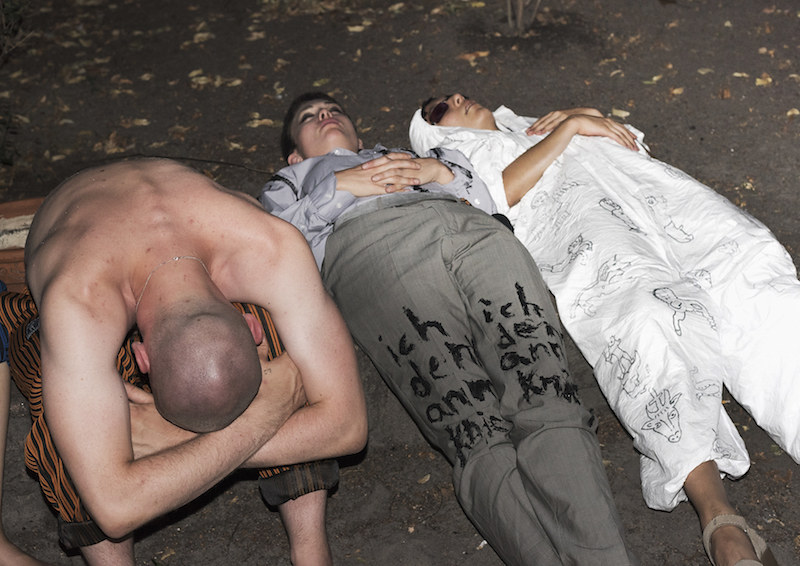
Project Space Festival, 09.08.2018, Kreuzberg Pavillon, Deep Nation; Photo © Piotr Pietrus
Giving Berlin's landscape of approximately 140 non-profit project spaces increased visibility, fighting for their rights, their funding and their appreciation, both the Netzwerk Freier Projekträume- und Initiativen e.V. and the Project Space Festival are initiatives which do considerable work to help the independent art scene to survive. I spoke to Chris Benedict, manager of the Netzwerk Freier Projekträume- und Initiativen, and Marie-José Ourtilane, the current manager of Project Space Festival, about their first collaboration this August.
Anna-Lena Werner: The Project Space Festival and the Netzwerk Freier Projekträume- und Initiativen are both organisations that support and connect Berlin's independent art scene. What led you to cooperate this year for the first time?
Chris Benedict: We share a common interest, of course, hoping to support Berlin's project space scene and to enhance its visibility. We, as the Netzwerk Freier Projekträume- und Initiativen, wanted to organise a larger and comprehensive festival format for Berlin's independent art scene. Being aware that the Project Space Festival already exists as a functioning structure for some years and not wanting to compete with its format, we wanted to collaborate. We focused on the realisation of discursive events and a printed brochure with several texts. Jointly doing public relations, activating each our networks and hosting the opening at ACUD and the closing party at c/o KUNSTPUNKT BERLIN together, this model of cooperation made a lot of sense to us.
Marie-José Ourtilane: When I decided to invite the Netzwerk, I was thinking that next to the festival's organisation – for the small team we are –we wouldn't have the time to face an additional discursive event. Since the Netzwerk is acting on the political field and it deals with the institution of the city, they are able to organise and manage such events and to give the public a larger perspective on the project spaces' reality.
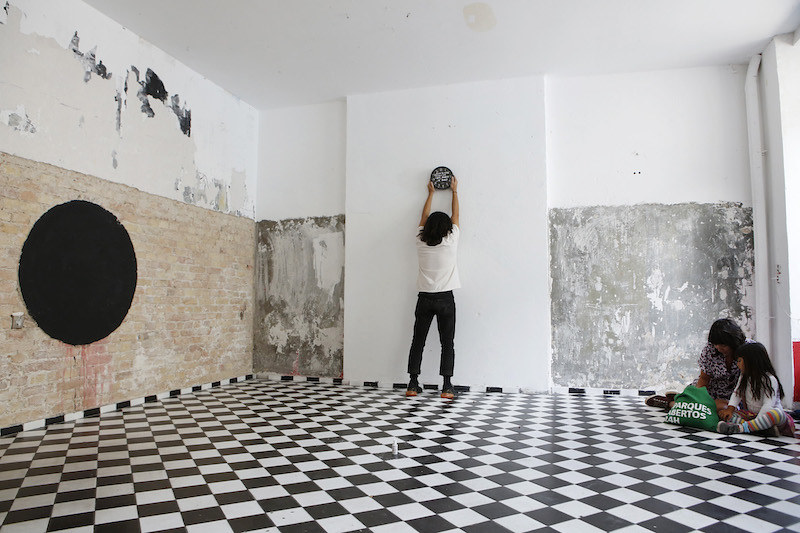
Project Space Festival, 11.08.2018, grüntaler9, LEGS, NINE; Photo © Joanna Kosowska
ALW: Can you put words on what the benefits of this collaboration are for both of you?
MJO: The panels will be interesting, but I guess the publication supporting the street poster campaign, banners and flyers will give the spaces more publicity. More visibility for the spaces was the main focus for this edition.
CB: The advantage is that we can better fulfil shared interests and aims: with our collaboration we can increase the scene's publicity, and advertise their programmes and their diverse locations around Berlin. Once the project spaces and initiatives receive more visibility, we as the network can better formulate their needs, especially towards politics and administration. At the same time, we share similar concerns and worries about the independent scenes' future. The increased publicity also helps create an awareness of the scene's demands for financial support in order to survive. Our collaboration also helps bringing different aspects of the scene together.
ALW: Which issues will be addressed in those panel discussions?
CB: The first one addresses difference between project spaces and galleries, that is, artist-run versus market: Where are grey zones? Is there even a sharp border or has this border become flexible? What are the differences in the work they do? We had very lively and controversial discussions about this subject for some time now and also addressed it in previous panels. Although we, as the Netzwerk, have clearly defined what we consider a project space or a project initiative, our definition may be not concrete enough yet. It is used inflationary. The second panel discussion addresses different types of networking and the coming and going of new and old spaces: some project spaces remain deliberately isolated while others focus on collective work and becoming part of society. What kinds of models exist? There are micro networks behind spaces run by 40 and more people, such as our project space WerkStadt Berlin e.V. (https://werkstadt.berlin), while other spaces are run by one single person. Both of the panel discussions are accompanied by artistic interventions and performances.
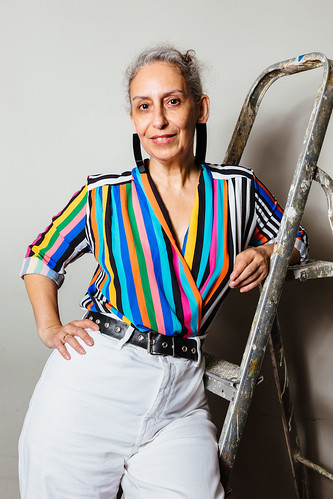 |
| Marie-josé Ourtilane, Management Project Space Festival; Photo © André Wunstorf |
ALW: The Project Space Festival was originally founded by the initiative Insitu. How did it come about that you, Marie-Jo, joined the team in 2016 and took over its management?
MJO: I wish I had come up with the concept of the PSF. It was initiated by Marie Graftieaux, Nora Mayr and Lauren Reid in summer 2014. I was a member of General Public at the time––a collective space. General Public was invited to participate in the festival's first edition and I was in charge of the event. A year later we were selected for the second edition and because we lost our space, I organised a podium discussion titled "That the fuck is a project space" hosted by NGBK. By the end of the festival, Marie, Nora and Lauren asked Heiko Pfreundt and me if we would be interested to continue the festival. We did it together in 2016; I do it this year alone and Heiko will take over the next year.
ALW: Each year, a changing jury selects project spaces that will host a one-day event for the festival throughout August. What criteria are important for the selection of the project spaces?
MJO: The jury changes every year, simply to get a new perspective each year. Even the festival's conception "moves" each year. Each time we try to experiment a new way, exploring new fields, reflexions, ideas––to avoid a possible routine.
ALW: You once mentioned that giving the festival a specific theme would be to constrain the spaces with a "curatorial corset." Can you, nonetheless, observe certain tendencies and focuses in this year's programme?
MJO: Yes, I actually find it very exiting that even without a "curatorial corset" a natural coherent setting establishes simply by the sharing of tendencies. The strongest genre this year is performance, but it's also noticeable that artistic practices are increasingly oriented to the mixing of genres, techniques and technologies. This mixing or inter-breeding leads to the dissolution of genre boundaries and classical categories. This introduces a very dynamic creativity. There are also contextual tendencies in the programme, such a history and narratives, personal or collective, fictional or mythological. But those tendencies mustn't reduce the spaces' rich diversity.
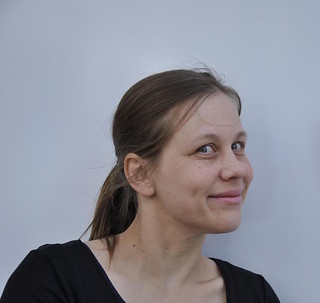 |
| Chris Benedict, manager of the Netzwerk Freier Projekträume- und Initiativen |
CB: Perhaps, because I realised that one doesn't get very far all by oneself. The aims of the Netzwerk are, for example, the protection of the scene – through creating a network but also through aid money. The community doesn't only have shared political and financial interests, but it also regularly organises programmes: We had a cooperative exhibition with Kunstwerke Berlin called "One Night Stand Series," we organised panel discussions at Haus der Kulturen Welt and Bar Babette. So, in a sense, the Netzwerk creates a structure for this community and transformed it into an association that represents shared interests and aims.
ALW: How many people are involved in each of your organisations?
CB: There are around 40 to 50 active members in the Netzwerk community. We have listed around 140 initiatives in Berlin that we consider project spaces and initiatives – non-profit, interdisciplinary, and open for third parties and discourses – but these are certainly not all and fluctuation is high and not easy to keep track of.
MJO: This year we are now 9 people, but the main organisation was done by only 4 of us. There are 27 spaces participating with 107 artists in total.
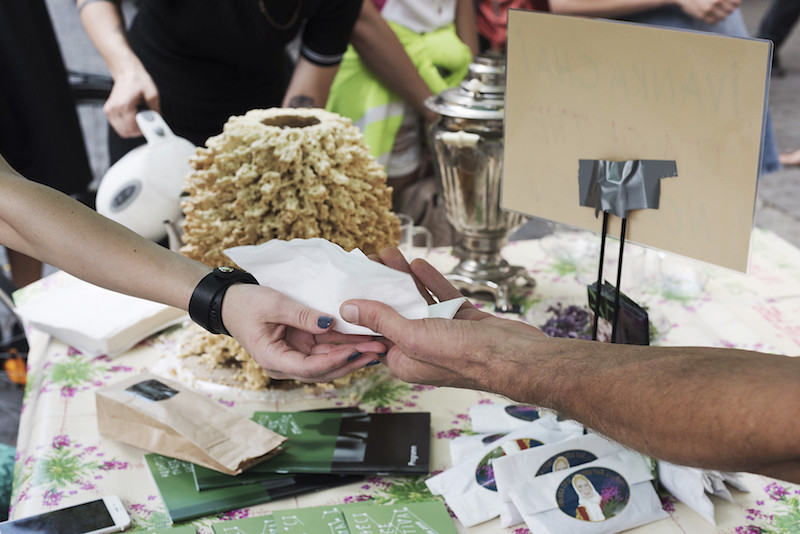
Project Space Festival, 14.08.2018, Kabinetas, Ivanka Chai / Иванка Чай / يفانكا تشاي ; Photo © Piotr Pietrus
ALW: As you have both been part of Berlin's independent art scene for a while, can you put words on how it's landscape has changed throughout the last years?
CB: It is noticeable how many spaces have closed, were forced to move out of the city's centre or to other locations. There are fewer niches that project space organisers can use, even temporarily. The pressure certainly got bigger. This change has affected not only the very established initiatives – such as ACUD, which exists since the 1990s – but also younger spaces. I presume everyone has by now been affected by the extreme rise of rental costs in Berlin. Maybe as an effect of this, many spaces have become more temporary – not necessarily as a concept but rather because there are no other options. What is new is a more solidified union and collaboration of spaces. The Netzwerk Freier Projekträume- und Initiativen e.V. has been initiated in 2009 and helped forming an acknowledged structure, even in political and administrative circles. Other initiatives like the Project Space Festival have also helped the scene’s visibility. Today the term “project space” is well known and understood.
MJO: My first Space was in Kastanienalle in middle of the city in 1998/99. We had 100m2 and paid 400 Euro. Every event was accompanied by a concert, or a DJ set and of course we had a bar. We never had any complaints from neighbours, never saw a policeman and never closed before 5 AM. There's not much more to say: apart from real estate speculation, life has normalized according to the conventional and controlled occidental model.
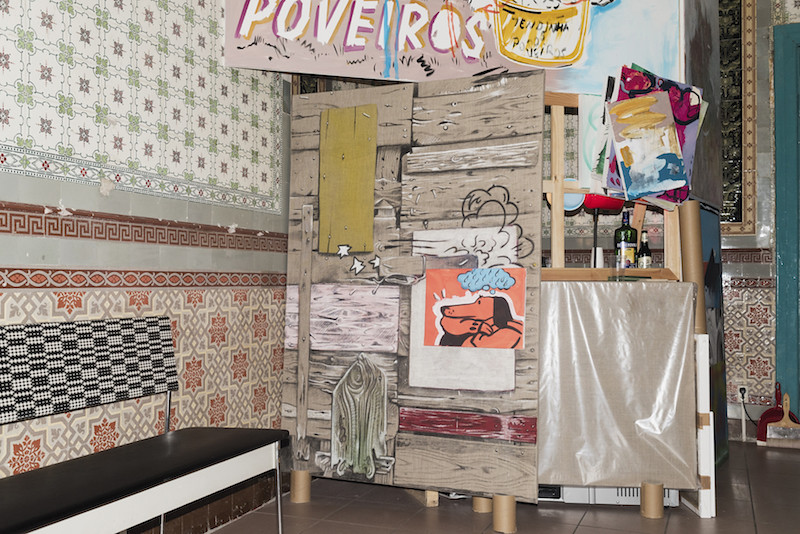
Project Space Festival, 17.08.2018, Farbvision, Pub Crawl,
Performance installation by Declan Clarke, Paul McDevitt, Cornelius Quabeck; Photo © Piotr Pietrus
ALW: Since 7 years the Berlin Senate annually offers prize money of 30.000 Euro for a changing selection of now 20 project spaces. Has the Netzwerk Freier Projekträume- und Initiativen e.V. been involved in the realisation of this crucial funding structure?
CB: That prize was the first outcome from our discussions with Berlin's cultural administration, trying to find ways for the state to help securing the landscape of independent and non-profit initiatives. Creating a funding structure was complicated for administrative and bureaucratic reasons––the prize money was a compromise solution. It's not what we had hoped for, as it's not very sustainable and only provides short-term help. Prizes, however, don't require drawing up an account and can be handed out easily and quick. That was crucial, to temporarily secure the existence of several places. We are still fighting for a funding model that can provide structural aid for a longer time.
PROJECT SPACE FESTIVAL
runs until the 31st of August across Berlin
Festival's website: projectspacefestival-berlin.com
Netzwerk's website: projektraeume-berlin.net
